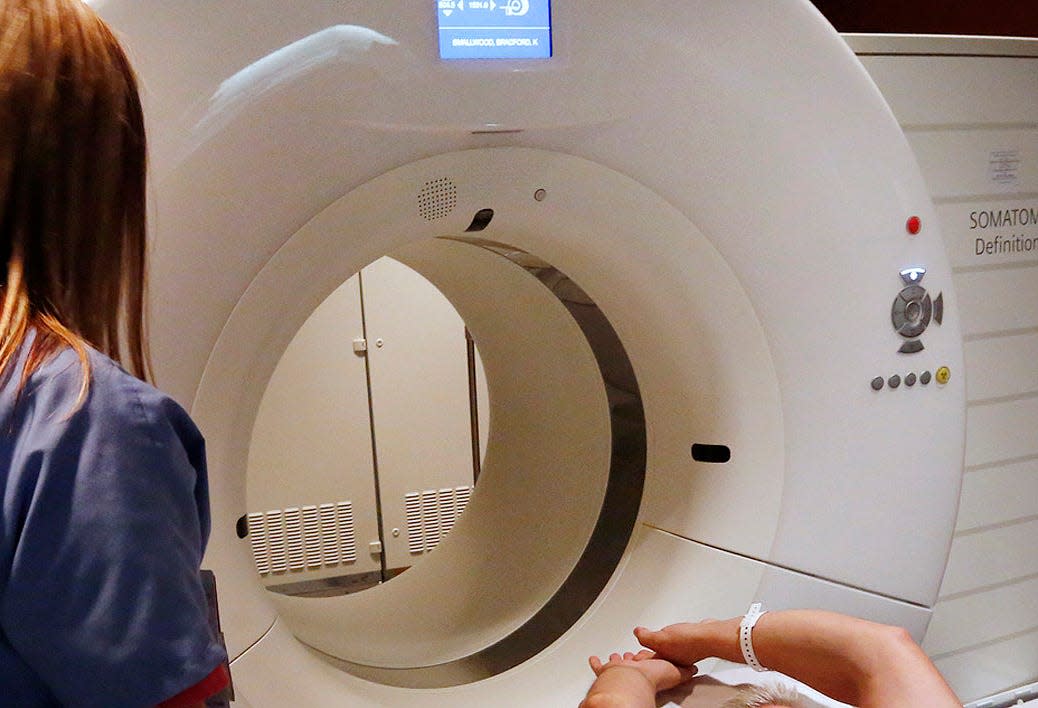Dr. Erika Kube: Concerns about dementia signs lead to CT scan and unexpected result

Ken was brought to the emergency department by his wife, Rebecca, who had concerns that he was forgetting things, slurring his speech and having difficulty with his balance.
Rebecca told the triage nurse that these symptoms had been going on intermittently for several months. Because the episodes seemed to be occurring more frequently, she called their family physician, who told them to come to the emergency department (ED).
The ED was busy the evening they arrived due to patients with injuries related to falls and car crashes because of snowy and ice weather. It took a couple of hours before Ken was able to get a bed. He told his wife that he was tired of waiting and they could come back another day. She refused to let him leave without being evaluated.
Dr. Erika Kube: Is there such a thing as drinking too much water?
Several of her friends had told her that they thought he was likely developing dementia, which was upsetting because her father had suffered from Alzheimer’s dementia and she remembered how hard it had been on her mother.

When I entered the room, Ken looked annoyed to be there. As I asked him what was going on, I paid close attention to how he spoke. I didn't notice any deficits in his speech as he told me that the only reason he was there was because his wife wanted to have him checked out. His wife quickly chimed in that she spoke with his doctor's office about his symptoms and they were concerned enough to send him to the ED.
Dr. Erika Kube: Respiratory disease RSV in kids — what are symptoms, why it's rising
Over the past several months, Rebecca had noticed that Ken had periods where something seemed off. He appeared confused and had trouble talking at times. She also noticed that he was occasionally off balance while walking and had to hold onto the wall or a chair to keep from falling. These symptoms always seemed to go away, and Ken brushed it off as nothing. Rebecca thought he was developing dementia.
I did a detailed neurological exam to see if I could elicit any abnormalities in Ken. He seemed just slightly delayed in answering some questions, but everything else was normal. Rebecca joked that he, of course, didn’t have all the symptoms he had been having while he was in the ED.
I asked Ken about his medical history as I simultaneously reviewed his chart and noticed he didn’t have any major medical problems. He said his doctor always gave him a clean bill of health. I asked the nurse to get blood and urine from Ken, and I ordered a CT scan of his brain. I wondered if Rebecca’s concerns about Ken possibly having dementia were right.
Dr. Erika Kube: Testicle pain embarrassing to talk about but shouldn't be ignored
I was surprised to receive a phone call from the radiologist about an hour later with a critical result. He told me there were numerous masses throughout Ken’s brain consistent with metastatic cancer. He asked if Ken had any history of cancer, which he did not.
I took a minute to gather my thoughts before I told Ken and Rebecca what was going on. When I walked in the room Rebecca must have sensed something was wrong as she immediately put her book down, sat straight up and held Ken’s hand. I pulled up Ken’s CT scan images so that I could show them the abnormalities.
Ken didn’t say much when I told him that it looked like he had cancer somewhere in his body that had spread to his brain, which had been causing his symptoms over the past few months. He looked at the computer screen with a blank stare. Rebecca was understandably shaken and upset. She kept asking how this was possible since Ken had always been so healthy. I felt so sad for them both as I tried to comfort them. I explained that Ken would need to undergo further evaluation to determine where the cancer had spread from, which would then determine what treatments could be considered for him.
Dr. Erika Kube: Did woman's twisted ankle spur rare chronic pain condition?
He underwent further imaging that unfortunately found that his primary cancer was in his lung and an MRI of his brain confirmed that he had numerous metastatic lesions. Metastatic spread of the cancer means that cancer cells separate from the primary tumor and travel through the blood stream or lymph system to other parts of the body.
Ken was diagnosed with non-small-cell lung cancer, which is the most common type, accounting for approximately 85% of lung cancers. While there are numerous factors that affect survival, in general, the life expectancy after a diagnosis of metastatic brain cancer from the lung is typically poor. Ken met with an oncologist, who advised him that there was not a curative treatment available, but there were several treatments such as radiation and chemotherapy available to him with the goal of helping him to live longer and feel better despite the cancer.
Making a diagnosis of cancer in Ken was not what he or I were expecting when he came to the ED that cold winter evening. I was grateful that Ken had not waited any longer to be evaluated and that he had an answer to what was wrong with him. I hoped he would do well with chemotherapy and be able to enjoy his life and time with Rebecca in the coming months.
Dr. Erika Kube is an emergency physician who works for Mid-Ohio Emergency Services and OhioHealth.
This article originally appeared on The Columbus Dispatch: Dementia concerns in healthy man lead to CT scan, cancer diagnosis

